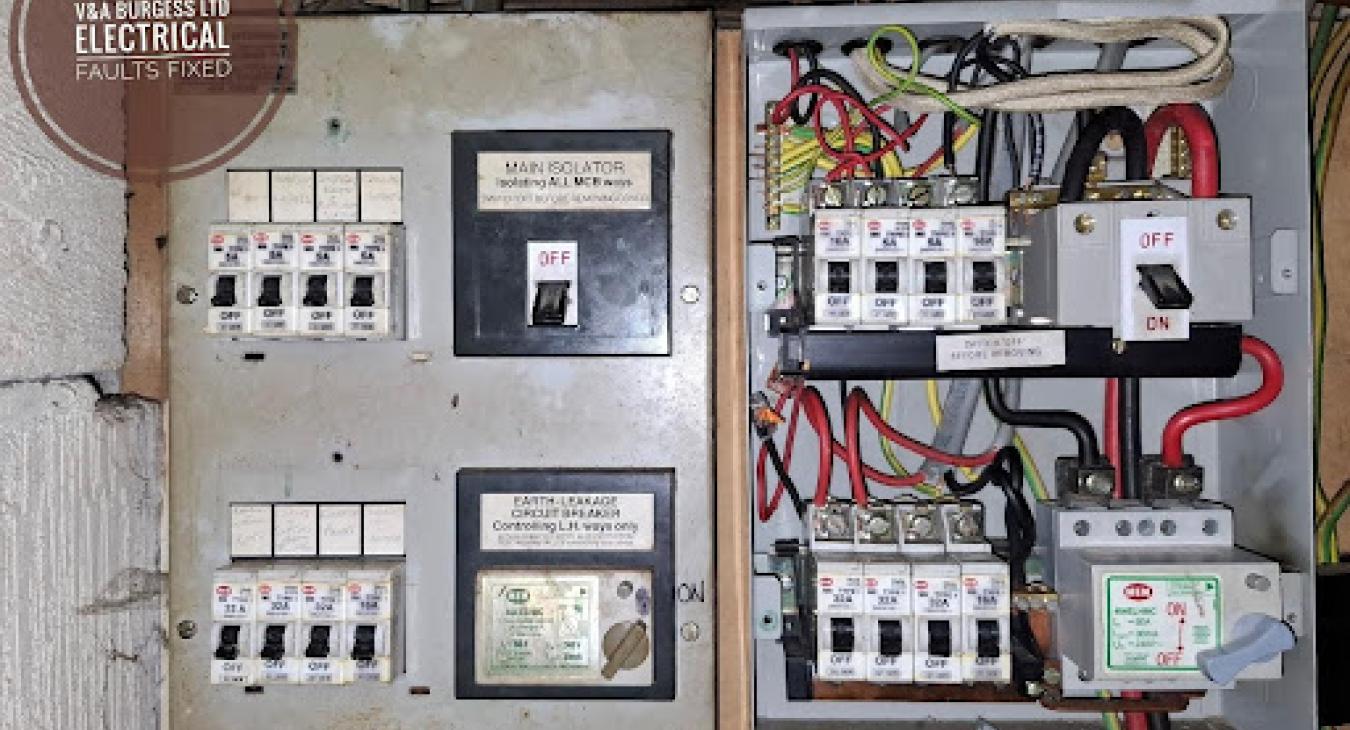Your Electrical Wiring: Hazards and Signs of Danger
Electrical Systems will work in a seemingly normal manner right up until the point of complete failure!
Table of Contents
- Flickering Lights
- Funny Burning Smells
- Crackling Plug Sockets
- Burnt Plug Sockets
- Fire Hazards
- Fuses and Fuse Wire
- Power extension cords and strips
- Tripping RCD / GFCI Switches
- Fuses Blowing
- Old Looking Equipment
- Rubber and Aluminum / Aluminium Wiring
- Number of Electric Circuits
- Rodent Damage
- Power Outages
- Conclusion
Only a qualified electrician can inspect an electrical installation to determine whether it is safe and suitable for continued use. There are some signs of dangers, hazards and electrical problems that you can keep an eye out for. In this article I will go through the most common issues and danger signs that you should be on the lookout for along with advising WHEN to call a professional to assist.
Let's outline the topics here first and then I will discuss each one in more detail below.
- Flickering Lights
- Funny Burning Smells
- Crackling Plug Sockets
- Burnt Plug Sockets
- Fire Hazards
- Fuses and Fuse Wire
- Power Extension Cords and Strips
- Tripping RCD / GFCI Switches
- Fuses Blowing
- Old Looking Equipment
- Rubber and Aluminum / Aluminium Wiring
- Number Of Electrical Circuits
- Rodent Damage
- Power Outages
- Shocks from Equipment or Pipework
1) Flickering Lights
Whilst lights can flicker for a variety of reasons, there are occasionally serious problems lurking when lights are flickering. The most common cause of flickering lights is dimmer switch and lamp incompatibility. Modern LED lights require a special dimmer to ensure that they can cope with the reduced electrical current. The lights themselves also need to be of the 'dimmable' type to ensure that flickering or damage does not occur.
Another common reason for lights flickering is loose connections. These can either be localised loose connections at the point of the light connection or, if all the lights in the house are dimming and flickering, it could be loose connections at the consumer unit, electrical panel or fuse box in the circuit breakers or fuse carriers for older homes.
Electrical issues in the street is a slightly less common occurrence than the others but nonetheless can cause lights to flicker. You can read more about lights that flicker in our article. An electrician is the best person to investigate flickering light problems.
Back to top2) Funny Burning Smells
There is NOTHING funny about electrical burning smells as they indicate that there is a fire present or about to start. If you can smell a fishy, plastic type burning smell then shut the power off immediately at the main switch or isolation point for your electrical system and call an electrician to attend.
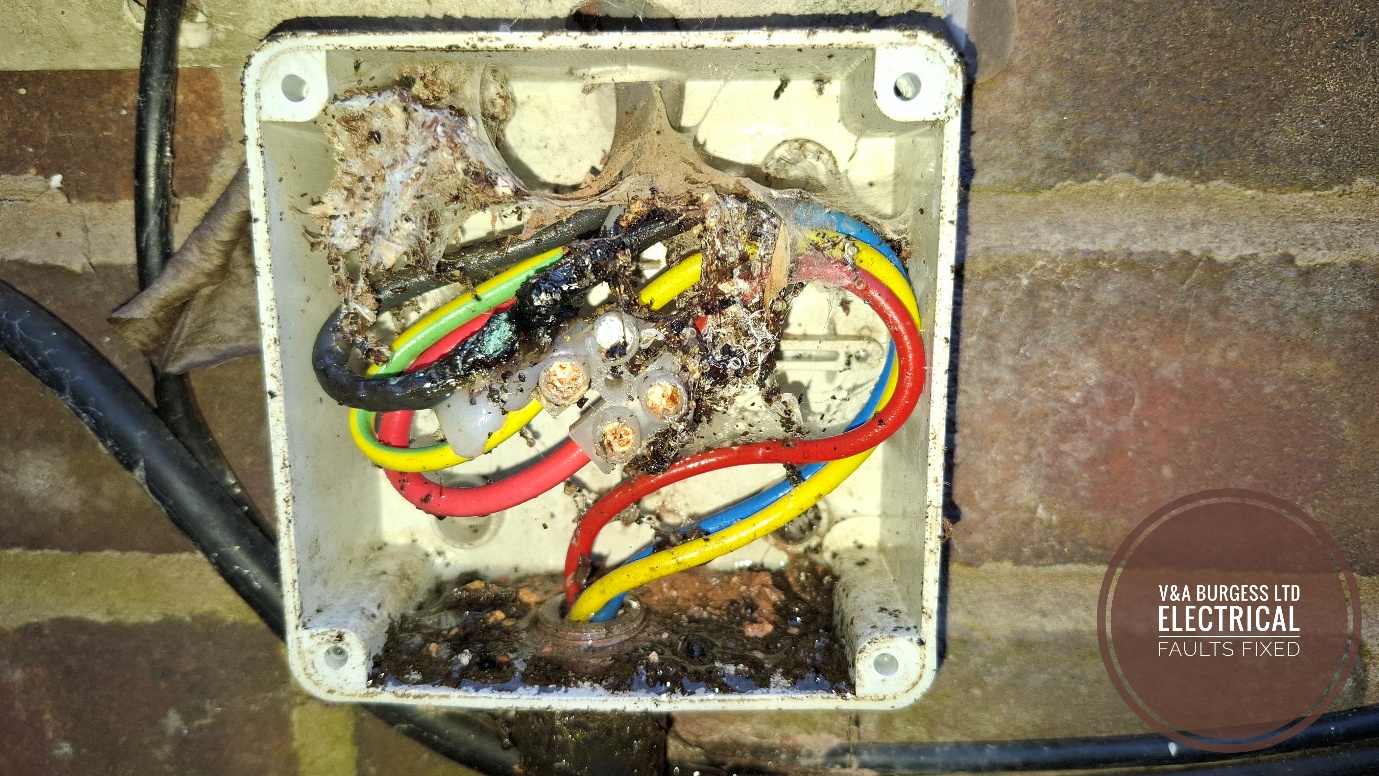
(Photograph: Burnt out wiring due to loose connections and overload)
Electrical burning is usually as a result of serious overloading, overheating or loose wiring leading to both. There is a separate article on electrical burning that may be of some interest.
Back to top3) Crackling Plug Sockets
I hope it goes without saying that socket outlets, plug sockets, or whatever you would like to call them, should not be making crackling sounds. The crackling sound is a result of electrical arcing which is a highly dangerous electrical fault situation that could result in electrical fires. If you have the sound of crackling from your sockets or anywhere else in your electrical system then ring an emergency electrician straight away for advice and attendance.
Back to top4) Burnt Plug Sockets
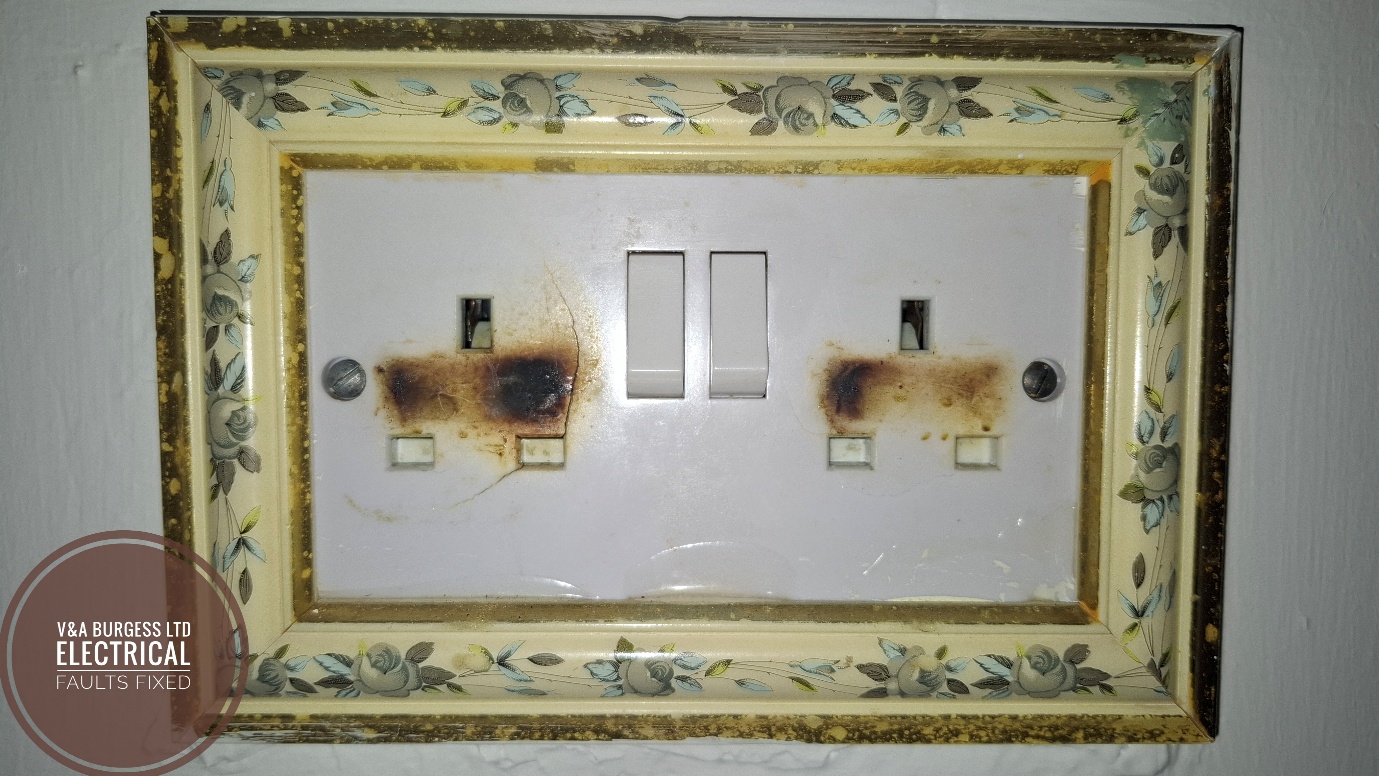
(Photograph: Burnt Plug Socket due to Faulty Appliance Plug)
When a plug socket becomes burnt, it needs replacement. Do not continue to use it and call an electrician straight away. A burnt plug socket cannot be left for days and weeks whilst ignoring it and using other plug sockets, it poses a risk to the rest of the electrical circuit and should be dealt with without delay. There is a separate article which covers more about burnt plug sockets in depth.
Back to top5) Fire Hazards
If you are wondering "are my electrics safe?" then it helps to look around your property to try and eliminate any risk of electrical fire. For instance, ensure that hot electrical equipment does not become covered, look at how many appliances you are using and have constantly connected. Are you overloading your electrical circuits with too much stuff? Fires can start when sockets, extension leads and electrical systems become overloaded so do your part and try to avoid excessive loading on any one circuit. Plugging a washer and dryer into the same outlet is likely to cause issues!
Back to top6) Fuses and Fuse Wire
If you have an old fuse wire or cylinder fuse box this is now well out of date, parts are obsolete and as a bare minimum, it should be checked by an electrician as part of an overall system inspection. An overall electrical system inspection looks at the earthing, cable insulation quality, electrical accessories and fuse box to determine if the system is safe and suitable for continued use. There is much more information regarding electrical inspections and what to expect in if you click here to read the article.
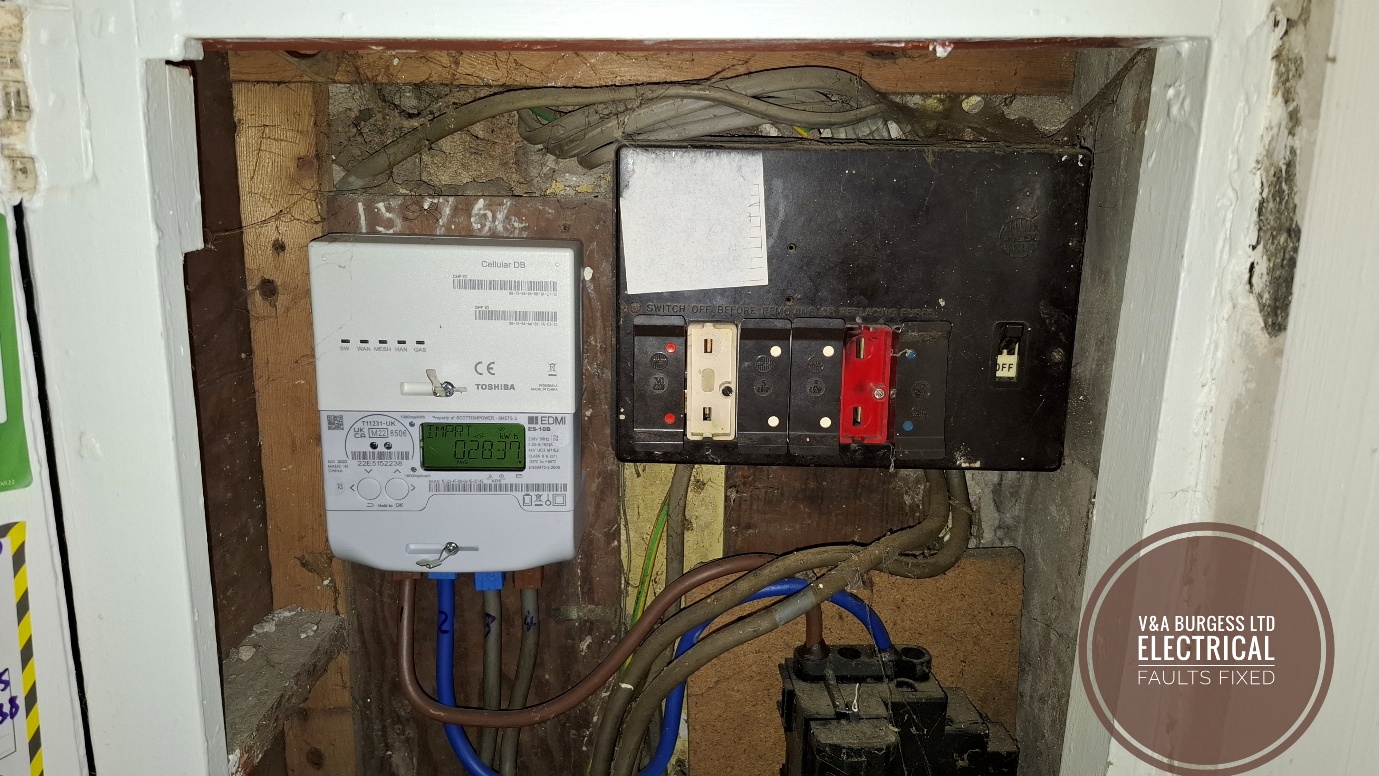
(Photograph: Ancient Fuse Wire Fuse Box that needs replacing)
Back to top7) Power extension cords and strips
One of the warning signs of overloading an electrical circuit and leading causes of home fires is an over reliance on the extension lead! The use of extension cords, power strips or long power cords to provide more electrical outlets is commonplace across the UK, Europe and rest of the world.
Electrical malfunctions are more likely to occur when excessively powerful equipment is plugged into an extension strip. Whilst extension cords appear to solve the issue of too few socket outlets, they have a limit to their power supply capability. Combine this with the fact that a home with single socket outlets in the rooms (normally 1 or 2 at most) tend to have very old wiring and you then have a recipe for disaster. Overloading old electrical wiring can cause complete electrical failure to your home's wiring.
Back to top8) Tripping RCD / GFCI Switches
The Residual Current Device (RCD) and Ground Fault Circuit Interrupter (GFCI) are devices that prevent serious electrical shocks. If you have these devices in your home electrical wiring system then it is at least relatively modern. These devices trip for a very good reason despite the annoyance that they may cause when doing so. Common reasons for tripping switches are: Water in Electrics, Rodent Damage, Faulty Appliances, Trapped Cables, Faulty Wiring, Excessive Earth Leakage and Overload.
Back to top9) Fuses Blowing
Fuses are still useful electrical devices despite the popularity of circuit breakers and trip switches. The fuse is designed to blow when the electrical current flowing through it creates enough heat to melt the wire inside the fuse or carrier. This can happen slowly with a prolonged overload (think 5 electrical fires plugged in) or very quickly with a high current electrical fault (Short Circuit).
Fuses do not protect against earth faults as well as RCD and GFCI devices. If a fuse blows then you usually have a more serious problem than when an RCD or GFCI goes. Try unplugging all your appliances on the circuit before replacing the fuse or wire. If that does not work then you will need an electrician. Professional electricians have a variety of specialised test equipment to determine if excessive electrical load is a problem, power surges or short circuits.
Back to top10) Old Looking Equipment
If your electrical system looks absolutely ancient then it likely needs upgrading or completely replacing (rewire). Don't forget about it and live with it because I guarantee it will bite you in the backside at no notice, usually over the holidays, weekends or other massively inconvenient time when all your food in the freezer will be ruined. Get an electrician to check it out for you and carry out an electrical inspection.
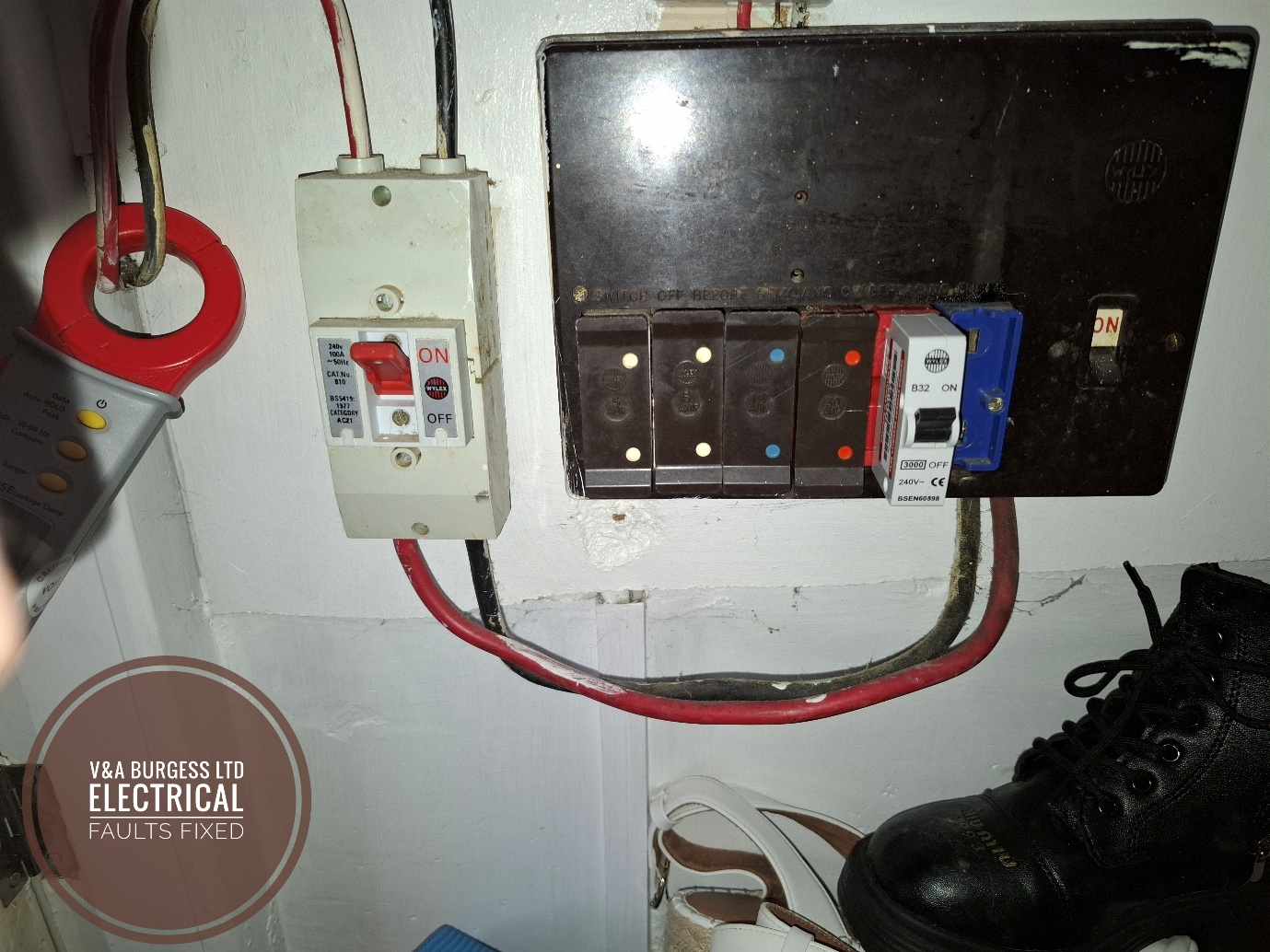
(Photograph: Old Looking Electrical Equipment)
Back to top11) Rubber and Aluminum / Aluminium Wiring
Rubber and Aluminium wiring along with Lead Sheathed Wiring are now absolutely ancient and should be replaced. These types of wiring are likely to pose a significant safety risk due to their age. Rubber will have become brittle and can fall away from the cable leaving the live metals exposed, aluminum wiring crushes when inserted into electrical terminals resulting in overheating and potential fires and lead sheathed cabling has rubber cores inside which will also likely short out on to the lead sheath when the wire is disturbed. This leads to short circuits and risk of electric shock. Send some pictures to your electrician and ask for advice.
Back to top12) Number of Electric Circuits
Each home should have a variety of electrical circuits for different functions. Lighting, Sockets, Cooker, Electric Shower etc. The bigger the home the more circuits will generally be installed by the electricians. If your home has only 3 or 4 circuits then you either have a tiny house or your electrical system is likely to be much older than you think. Many years ago, we used to wire a single socket outlet circuit, one (or two) light circuits and possibly a circuit for an electric cooker. These days we split circuits up to reduce the stress on them and to minimise inconvenience in the event of an electrical fault.
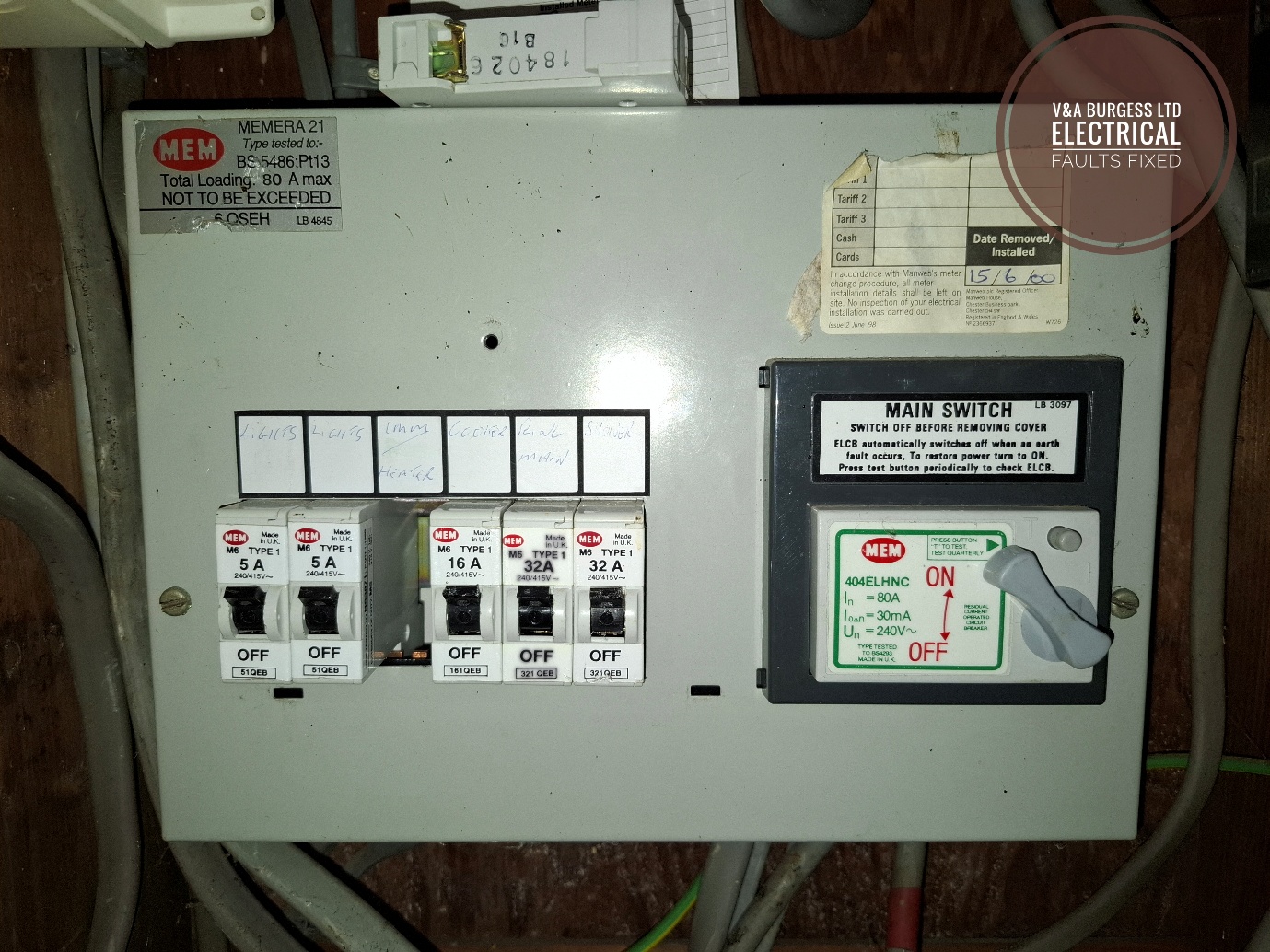
13) Rodent Damage
Rodents absolutely LOVE cables. They love chewing right through them, don't care about electrical dangers and will ruin your wiring without a second thought. If you have any signs of rodents, it is absolutely vital that you get rid of them as soon as possible to avoid any property damage to your home. Tripping RCD and GFCI devices is a sign that rodents may be causing damage to your wiring.
Back to top14) Power Outages
If you are experiencing Intermittent Power Outages then it’s best to check if there are any issues with the supply network company in your area. In the UK, you can do this by calling 105 and following their phone menu. They will let you know if there are any planned or emergency works in your area. If no works are being carried out then it’s likely that the intermittent power outages are down to your property alone. This could be as a result of loose connections where your supply joins the street supply and if so, they may well be buried under a driveway or road. Calling a licensed electrician is important in this case as they will be able to check if there are any issues with your supply or if the problem is down to your home installation.
Back to top15) Conclusion
The main causes of home electrical dangers can be solved with regular maintenance, inspection and professional testing by an electrician. Take care when connecting major appliances like kitchen appliances that you do not overload your circuits. If your breaker panel or fuse box is old then it should be replaced and the whole system tested by a professional electrician to ensure safety. Finally, if you have suspicions that your electrical system is not safe then it most likely IS NOT SAFE. It is easy to talk ourselves out of spending money or having things checked out for fear of costs, being ripped off or taken advantage of but it’s VITAL that your electrical system is checked frequently by a qualified professional to ensure its safe operation.
Back to top
